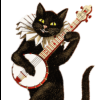I voted that you can create your own character, and I voted that way because the title of this thread identifies your game as a Role-Playing Game (RPG). A major part of role-playing is developing and shaping your own character. In fact, I would argue that this aspect is what makes something a role-playing game rather than another type of game.
However, you also state that "you can liken it to a visual novel." This statement seems to put your game in the genre of Adventure Game (like King's Quest, Monkey Island, The Walking Dead Game, etc). In this case, you definitely want a pre-defined character as the protagonist as that character's story and personality is a big part of the game.
Ultimately it comes down to what genre of game you are really making, Role Playing or Adventure. There have also been a few games that try to blur the lines a bit. Quest for Glory comes to mind. I think ultimately sticking with the standard for the genre unless there is a compelling reason not to is a good idea.
First, I'd like to thank you for participating in the poll. It's true that an important part of most role-playing games is shaping your own character. That's what I love about them; it is the genre that really hones in on character development and that experience of role-playing in an interactive story. On that note, there most certainly are hybrids of the genre (there are actually a few different standards for RPGs).
For instance, the main difference between a WRPG (western role-playing game) and a JRPG (Japanese role-playing game) is just how much control you have over the development of a character. JRPGs are famous for their meticulously pre-defined characters and storylines. In the WRPG, you can often create your own character and have a lot more wiggle room in his or her development. I didn't explicitly make this distinction (JRPG vs WRPG, instead of Pre-Defined vs Blank Slate) in my original post, and I apologize for that.
As a side note, by "liken it to a visual novel," I meant that you have control over the flow of the story and the development of its characters (as you mentioned earlier). For instance, you have a dilemma in the game and have to choose how you wish to handle it. In short, you can definitely role-play issues out!
Thanks again for your feedback! You considered a few things that I hadn't thought about before and helped me reconsider what type of game I am actually going for.











